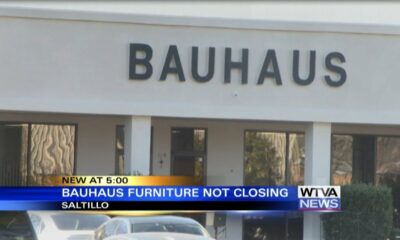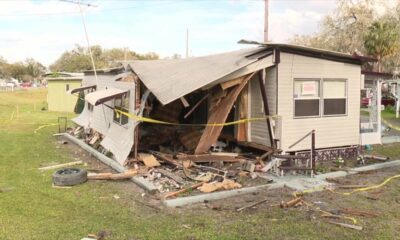Mississippi Today
‘Easy to just write us off’: Rural students’ options shrink as colleges slash majors

This story was co-published with Open Campus, The Hechinger Report, and The Washington Post
CLEVELAND, Miss. — With no car and a toddler, Shamya Jones enrolled this fall at the four-year university in her small town in Mississippi — Delta State University.
She planned to major in digital media arts, but before she could start, the college eliminated that major, along with 20 other degree programs including history, English, chemistry and music.
“They’re cutting off so much, and teachers [are] leaving,” Jones said. The cuts “take away from us, our education.”
Across the country, rural students like Jones are feeling short-changed and frustrated.
Many of the comparatively few universities that serve rural students are eliminating large numbers of programs and majors, blaming plummeting enrollment and resulting financial crises. Nationwide, college enrollment has declined by 2 million students, or 10 percent, in the 10 years ending in 2022, hitting rural schools particularly hard. An increasing number of rural private, nonprofit colleges are not only cutting majors, but closing altogether.
“We are asking rural folks to accept a set of options that folks in cities and suburbs would never accept,” said Andrew Koricich, a professor of higher education at Appalachian State University in Boone, North Carolina. “It’s almost like, ‘Well, this is what you get to learn, and this is how you get to learn it. And if you don’t like it, you can move.’ ”
For many rural students, there are already few places to go. About 13 million people live in higher education “deserts,” the American Council on Education estimates, mostly in the Midwest and Great Plains, where the nearest university is beyond a reasonable commute away.
Meanwhile, more than a dozen private, nonprofit universities and colleges that are in rural areas or serve large proportions of rural students have closed since 2020, data show.
“It is creating a second class of people to say, ‘You pay your taxes just like everybody else does. You vote like everybody else does. But you just can’t have the same choices as everybody else, because there aren’t enough of you here,’” Koricich said of the cuts. “In a lot of rural places, the idea of choice is sort of a fiction,” he said.
Rural-serving institutions are defined by the Alliance for Research on Regional Colleges, or ARRC, which Koricich directs, as those located in counties classified as rural and not near a metropolitan area.
Even some flagship universities that serve rural communities are making big cuts. West Virginia University this fall began the process of eliminating 28 undergraduate and graduate majors and programs, including most foreign languages and graduate programs in math and public administration. The University of Montana is phasing out or has frozen more than 30 certificate, undergraduate and graduate degree programs and concentrations. A course review is also underway at branch campuses of Pennsylvania State University due to declining enrollment.
But most of the cuts have occurred at regional public universities, which get considerably less money from their states — about $1,100 less, per student, than flagships, the ARRC calculates. Regional institutions educate 70 percent of undergraduates who go to public four-year schools, according to the American Association of State Colleges and Universities. These campuses are also more likely than other kinds of institutions to enroll students from lower-income families and who are the first in their families to go to college, the Baltimore-based Art & Science Group consulting firm found.
St. Cloud State University in Minnesota is cutting 42 degree programs, for example, including criminal justice, gerontology, history, electrical and environmental engineering, economics and physics. The University of Alaska System has scaled back more than 40 programs since 2020, including earth sciences, geography and environmental resources and hospitality administration. Also during that period, Henderson State University in Arkansas dropped 25 and. Emporia State University in Kansas cut, merged or downgraded around 40 undergraduate and graduate majors, minors and concentrations.
The State University of New York at Fredonia is dropping 13 majors. SUNY Potsdam is cutting chemistry, physics, philosophy, French, Spanish and four other programs. The University of North Carolina Asheville is discontinuing religious studies, drama, philosophy and concentrations in French and German.
Related: In this shrinking Mississippi Delta county, getting a college degree means leaving home behind
“Some institutions have no other options” than to do this, because of financial problems and plummeting enrollment, said Charles Welch, president and CEO of the American Association of State Colleges and Universities and a former president of Henderson State and the Arkansas State University System, both of which have cut programs.
At Delta State, for instance, enrollment is down by nearly a quarter since 2014.
A drop in tuition revenue stemming from that decline created an $11 million hole in the university’s budget, President Daniel Ennis told the campus last year. When Ennis got to Delta State, he also found the university was overestimating its revenue from facilities and merchandise.

“At a certain point there’s going to be less of everything — personnel, money, equipment and opportunities — because we have to rightsize the budget,” Ennis said.
But the American Association of University Professors, which represents faculty, said in a 2021 report that problems such as enrollment drops made worse by the pandemic are being exploited by administrators to close programs “as expeditiously as if colleges and universities were businesses whose CEOs suddenly decided to stop making widgets or shut down the steelworks.”
Welch said schools are often simply trying to reduce program duplication among campuses in the same systems and compensate for having less financial support than flagship universities.
“The challenge that our institutions have is that they tend to be lower resourced than institutions in urban areas, or flagship institutions. They can’t rely on big endowments,” Welch said. The pandemic, he said, “threw a whole additional layer on top of what those institutions were already facing.”
Many of the majors affected are in the humanities and languages, making those disciplines less available to rural students than they are to people who live in urban and suburban areas.
These subjects “do much of the work of helping students dream beyond their realities,” said Michael Theune, who chairs the English Department at Illinois Wesleyan University, a private, nonprofit school that has also eliminated majors. “We are paring down the sense of the vastness of our world and the possibilities of university students to experience it differently.”
Some rural-serving public universities and public universities in largely rural states have now undergone repeated rounds of cuts. Youngstown State University in Ohio, for instance, axed Italian, religious studies and other majors in 2021, then six more this year. In all, more than 25 programs have now been eliminated there, many of them in the humanities.
The university, in a message to the campus, pointed out that there were no students at all in 10 of those majors. But students and faculty say it was still important to offer them.

“It is easy to just write us off as, ‘Oh, well, do they really need that school?’ when there are so many other majors,” said Owen Bertram, a senior theater major whose program has so far escaped the cuts. “But I don’t think it’s that simple.”
Bertram, who is also student government representative for the university’s College of Creative Arts, said it’s hard to watch his classmates who wanted to study humanities struggle with the questions, “Do I stay?” “Do I leave?” “Is it worth it?”
At many of the schools, it’s too early to tell if the program cuts will lead to even lower enrollment. In some cases, however, enrollment has continued to decline. At Emporia State, enrollment is down by 14 percent in the two years since about 40 majors were eliminated there.
These cuts come at a time when the proportion of rural high school graduates going to college is falling. Fifty-five percent enroll right after high school, down from 61 percent in 2016, according to the National Student Clearinghouse Research Center. That’s a lower rate than the national average.
Low-income and Black students are disproportionately impacted by program cuts. The University of North Carolina Greensboro, for example, is in the process of phasing out 20 degree programs, including anthropology and physics. More than half the students are low income and 28 percent are Black, according to the state university system.

“UNCG should be a place where anyone should be able to come and get an affordable education in whatever they want,” said Holly Buroughs, a physics major who started a petition protesting the cuts.
“Is a first-gen student like me going to come next year and not see the UNCG that I fell in love with and the opportunities I had?” asked Azariah Journey, a second-year graduate student in history who comes from a rural town in Kentucky.

Related: A community college promises a rural county it ‘hasn’t been left to die’
Dominick Bellipanni is one of the last remaining music students at Delta State as the department is being phased out. He received a scholarship to study piano, which he isn’t sure he would have gotten at the state’s larger, more competitive universities.
Bellipanni is from Indianola, a once-busy crossroad 30 minutes from the university, where he grew up hearing stories about businesses that once operated there but closed.

“Used to be, used to be, used to be,” he remembered people telling him.
Now he’s hearing that again.
His professors talk about how there used to be more music recitals, more scholarships, more money, said Bellipanni, who said he plans to leave the Mississippi Delta when he graduates.
“All you hear is, ‘We used to have this, because we used to have more students.’ ”
Contact writer Jon Marcus at 212-678-7556 or jmarcus@hechingerreport.org.
This story about rural college majors was produced by The Hechinger Report, a nonprofit, independent news organization focused on inequality and innovation in education, and Open Campus, a nonprofit newsroom focused on strengthening local coverage of higher education. Reporters in the Open Campus Local Network contributed: Mississippi Today’s Molly Minta, WUNC’s Brianna Atkinson and Signal Ohio’s Amy Morona
This article first appeared on Mississippi Today and is republished here under a Creative Commons license.![]()
Mississippi Today
Yes, SEC hoops is deeper than ever, but don’t forget the star power of 1980s and ’90s
Yes, SEC hoops is deeper than ever, but don’t forget the star power of 1980s and ’90s
If I’ve heard it said once this basketball season, I’ve heard it a couple hundred times: “The Southeastern Conference is better than it’s ever been.”
I agree with that statement in one regard. That is, SEC basketball, from top to bottom, is better than ever. The league has more teams, more really good teams, more balance and is more competitive than it has ever been. It is the best league in the country by far.

This week’s Associated Press poll says as much: Three of the top five teams are from the SEC. What’s more, four of the top eight, five of the top 14, and six of the top 15 are all SEC teams.
You could make the case that in order to win this week’s SEC Tournament at Nashville, the eventual champion will have to beat more top shelf teams than it would have to beat to win the NCAA Tournament. The league is that good.
But don’t tell me the quality of SEC basketball is better than it was during a period in the late 20th century when Wimp Sanderson was at Alabama, Sonny Smith at Auburn, Nolan Richardson at Arkansas, Dale Brown at LSU, Joe B. Hall and Rick Pitino at Kentucky and Richard Williams at Mississippi State.
Don’t tell me the SEC has the star power now that it had back when players as splendid as LSU’s Shaquille O’Neal, Auburn’s Charles Barkley, Georgia’s Dominique Wilkins and Kentucky’s Jamal Mashburn played three years of college ball before going pro. That’s the biggest difference. Back then, players stayed in college for at least two or three years. Not now.
When Mississippi State shocked Kentucky (and the college basketball world) and won the 1996 SEC Tournament Championship, 11 of the players in that championship game went on to play in the NBA. Nazr Mohammed, a 6-foot, 11-inch bruiser, could scarcely get off the bench for Kentucky in 1996, but went on to play 18 NBA seasons. My point: In 1996 there were 11 future NBA players in one game. Now, there might not be 11 NBA players the entire conference.
Another way to say it: The SEC has more good basketball players now than it has ever had. It had more truly great players during the ‘80s and ‘90s. Think about it. Besides those already mentioned, you had Allan Houston at Tennessee, Vernon Maxwell at Florida, Chuck Person at Auburn, Mahmoud Abdul-Rauff (then Chris Jackson) at LSU, Derrick McKee, James “Hollywood” Robinson and Latrell Sprewell at Alabama, and so, so many more.
Heck, Wimp Sanderson had Sprewell, Robinson, Robert Horry, Jason Caffey and Marcus Webb – all future NBA players – on the same team and still somehow found plenty to frown about.
Richard Williams, still radio analyst for Mississippi State (and recovering nicely from a health scare weeks ago), agrees the league is better, top to bottom, than ever. He says it is by design.

“The commissioner (Greg Sankey) made basketball a priority,” Williams said. “He hired an associate commissioner for basketball and strongly suggested that all SEC members upgrade their schedules, and invest in both facilities and coaches. We’ve seen that happen and now we see them also investing in talent.”
You can do that legally now via NIL. This is not to say some programs weren’t “investing” in players under the table back in the late 20th century.
The SEC Tournament begins Wednesday at Bridgestone Arena in Nashville. Mississippi State plays LSU in a first round game Wednesday at 6 p.m. Ole Miss, by virtue of its better league record, doesn’t have to play until Thursday at noon when the Rebels will play the winner of the first round game that matches Arkansas and South Carolina.
Should State beat LSU, the Bulldogs would play Missouri in the second round. Win that one, and Florida would be next. Should Ole Miss win its Thursday game, the Rebels would play top-seed Auburn in the quarterfinals. Clearly, both Mississippi teams face really difficult tasks. Regardless, both will play in the NCAA Tournament.
If you ask me, Auburn, the best overall team, is the odds-on favorite, but Florida, Alabama and Tennessee are all capable of winning the championship. For that matter, all four are capable of winning the national championship. That’s perhaps the best measure of how strong the league is.
Mississippi State sophomore Josh Hubbard won the Bailey Howell Trophy as Mississippi’s top men’s college player, announced Monday at a luncheon at Pearl River Resort in Philadelphia. Ole Miss senior Madison Scott won the Peggie Gillom as the top women’s player.
This article first appeared on Mississippi Today and is republished here under a Creative Commons license.![]()
p>
Mississippi Today
On this day in 1959

March 11, 1959

“A Raisin in the Sun,” the first Broadway play written by a Black woman, debuted at the Ethel Barrymore Theater.
Lorraine Hansberry, then only 28, drew inspiration for her play from a Langston Hughes’ poem: “What happens to a dream deferred? Does it dry up like a raisin in the sun?”
Hansberry also drew on her past, her family winning a landmark court case in 1940 against real estate covenants that discriminated against Black Americans, Jews and others.
She attended the University of Wisconsin, only to leave to pursue a career as a writer in New York City in 1950. She fought against evictions in Harlem, worked with W.E.B. Du Bois and Paul Robeson as she wrote for the Black newspaper, Freedom, and made speeches for equal rights.
“Raisin in the Sun” starred Sidney Poitier, Claudia McNeal and Ruby Dee on Broadway and became the first play of the modern era with a Black director, Lloyd Richards. The New York Drama Critics’ Circle named it the best play, and it was adapted into a 1961 film, which starred the original Broadway cast.
Hansberry wrote the screenplay, and Dee won Best Supporting Actress from the National Board of Review.
In 1963, she met with Attorney General Robert Kennedy, questioning the administration’s dedication to civil rights. That same year, she was diagnosed with pancreatic cancer. She died two years later, and Robeson and SNCC organizer James Forman gave eulogies.
Her friend, Nina Simone, wrote the song, “Young, Gifted and Black” to honor Hansberry. In 1973, her first play became a Broadway musical, “Raisin,” which won the Tony for Best Musical. In 2010, Hansberry’s family home became a historic landmark, and the play, considered one of the great plays of the 20th century, continues to be performed on Broadway and across the nation. PBS featured her in American Masters’ Inspiring Women.
This article first appeared on Mississippi Today and is republished here under a Creative Commons license.![]()
Mississippi Today
Fatalities reported in UMMC helicopter crash

An AirCare helicopter from the University of Mississippi Medical Center crashed near the Natchez Trace Parkway this afternoon.
A Madison County official confirmed to WLBT that there were fatalities. They were quoted saying, “We are on the scene of a medical helicopter crash in a heavily wooded area south of the Natchez Trace and north of Pipeline Road. There are fatalities. We are now awaiting the arrival from the FAA. Any other information should come from them.”
At the time of publication, authorities have not revealed how many fatalities or identified them. In an email, Vice Chancellor for Health Affairs Dr. LouAnn Woodward stated, “Two UMMC employee crew members and a Med-Trans pilot were on board. There was no patient aboard.”
The helicopter crashed in a heavily wooded area near the Natchez Trace Parkway and Highway 43. Madison County Sheriff’s Office, Gluckstadt Fire Department and several other first responders are at the scene.
UMMC’s flight program, AirCare, includes helicopters based in Jackson, Meridian, Columbus and Greenwood. The helicopters are used to transport patients to and from UMMC and other hospitals.
This article first appeared on Mississippi Today and is republished here under a Creative Commons license.![]()
-

 News from the South - Louisiana News Feed6 days ago
News from the South - Louisiana News Feed6 days agoRemarkable Woman 2024: What Dawn Bradley-Fletcher has been up to over the year
-

 News from the South - Oklahoma News Feed3 days ago
News from the South - Oklahoma News Feed3 days agoFeed the Children rolls out new program to help Oklahoma families
-

 News from the South - Oklahoma News Feed5 days ago
News from the South - Oklahoma News Feed5 days agoMarch 6,2025: Rain and snow on the way
-

 News from the South - Texas News Feed6 days ago
News from the South - Texas News Feed6 days agoTravis County DA failed to meet deadline to indict murder suspect | FOX 7 Austin
-

 Mississippi Today4 days ago
Mississippi Today4 days agoJudge tosses evidence tampering against Tim Herrington
-

 Mississippi Today7 days ago
Mississippi Today7 days agoKey lawmaker reverses course, passes bill to give poor women earlier prenatal care
-

 News from the South - Florida News Feed6 days ago
News from the South - Florida News Feed6 days ago64-year-old woman injured after car crashed into her mobile home in Zephyrhills
-

 News from the South - North Carolina News Feed5 days ago
News from the South - North Carolina News Feed5 days agoSchool officials voice concerns as US Department of Education remains in limbo













































